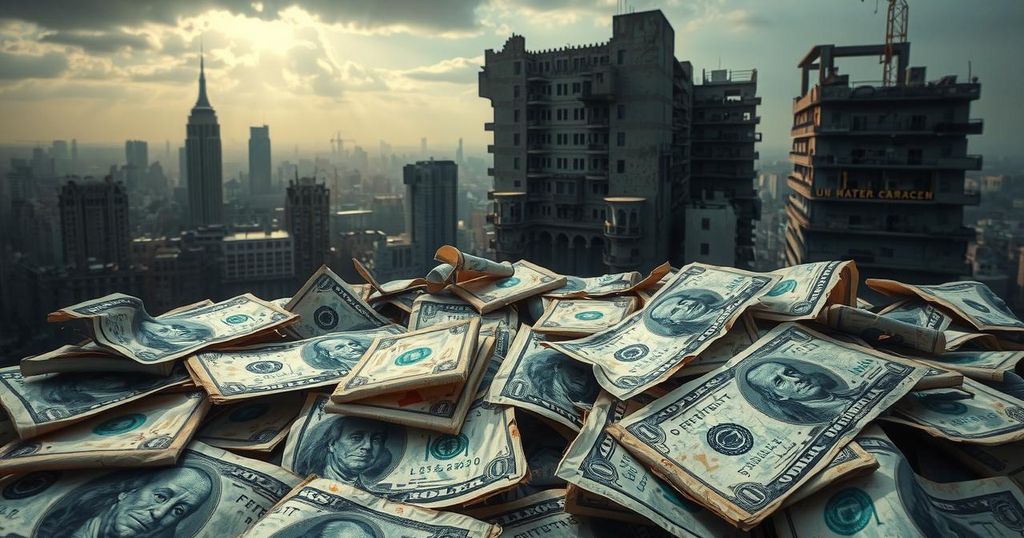Iran’s clerical regime is increasingly worried about a potential social explosion as economic crises worsen. With inflation soaring, a collapsing currency, and significant public discontent, officials warn of mass unrest prompted by corruption and resource shortages. Demonstrations have erupted in various provinces, reflecting the populace’s growing frustration over systemic injustices and economic hardship.
Amid escalating economic turmoil and deteriorating living conditions, Iran’s clerical leadership expresses growing alarm over a potential social explosion. Rapid inflation, a plummeting currency, and rising public discontent have prompted high-ranking officials to issue multiple warnings regarding the risk of widespread unrest. On March 1, President Masoud Pezeshkian highlighted the critical nature of Iran’s water crisis, stating, “The danger posed by water imbalance threatening Tehran and the region today is terrifying.”
Hessam Khosravi, Deputy Minister of Water Operations, indicated that water rationing in Tehran is imminent due to a 25% decrease in rainfall compared to the previous year. Reservoirs are severely depleted, with major dams reaching only 6% of full capacity, sparking protests in Chaharmahal and Bakhtiari province, where demonstrators warned against the consequences of sustained neglect.
On March 3, Ahmad Tavakoli, chairman of the state-affiliated Transparency and Justice Watchdog, underscored the consequences of systemic corruption, admonishing officials to “fear the rage of the poor.” He emphasized that corruption, more so than sanctions, fuels Iran’s economic decline. Citing the Debsh Tea scandal, he questioned whether organized crime could thrive without centralized support.
State media reflect similar concerns, with Ham Miham warning of public fury in light of soaring inflation, which now exceeds 40%. The publication questioned, “Why shouldn’t the people buy dollars and gold, when inflation devours their savings?” It warned of potential unrest should basic services remain unavailable, acknowledging ongoing educational disruptions due to governmental failures.
On February 28, MP Ali-Asghar Nakhee revealed on state television that the purchasing power of Iranians has plummeted by 40% over the past year. He lamented that minimum wages fail to cover basic living costs, stating, “How can we expect people to survive?” While some officials warn against public anger, others advocate for suppressive measures to quell dissent.
Mohammad Laini, Friday Prayer Leader in Sari, stressed the importance of instilling fear in adversaries, asserting, “We must strike fear into the hearts of our enemies.” He noted internal discussions about external threats and acknowledged the regime’s struggles to stabilize the economy. Additionally, he criticized government inaction in addressing inflation and currency challenges.
As Ramadan coincides with Nowruz, security forces remain on high alert due to fears of public unrest. Laini acknowledged that even security personnel are experiencing hardships, indicating that the situation becomes ever more challenging to manage. With the nexus of water scarcity, poverty, inflation, and systemic corruption, Iran faces a precarious situation as officials scramble to avert what seems to be an impending explosion of social discontent.
In summary, Iran’s leadership is increasingly anxious about an imminent social explosion, driven by economic instability, rampant corruption, and public disillusionment with the regime. High-ranking officials recognize the potential for widespread unrest as vital resources like water become critically scarce and inflation continues to erode citizens’ purchasing power. The regime’s inability to address these mounting crises has sparked protests and intensified calls for systemic change, illustrating the gravity of the situation. Amidst this turmoil, officials face a dilemma between suppressing dissent through fear tactics and addressing the root causes of public discontent to stave off unrest. The coming weeks or months may prove decisive as pressures mount in the lead-up to significant cultural observances such as Ramadan and Nowruz.
Original Source: www.ncr-iran.org




